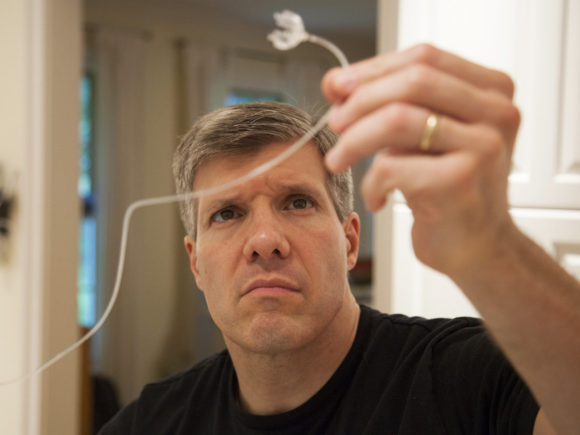
I grew up around diabetes. Grandma Graff was a constant presence in our family. She was a practicing diabetic. She measured her food by the bite. Injections of insulin were like clockwork. To me, as a kid, she was diabetes. Her husband was also a diabetic but did not manage it well. I never met him. He died at 54. My father was diagnosed late in life and managed the disease quite well with finger pricking and injections.
When I heard the story Monday on National Public Radio about Ed Damiano’s obsession to build a viable robotic pancreas for his 15-year-old son David before he goes away to college, it really hit home.
Ed Damiano was an engineering professor when his son was diagnosed with Juvenile Diabetes at 11 months old. Some diabetic kids die sleeping in the middle of the night. Since the time David was diagnosed up until today, Ed has gotten up in the middle of the night to check if his son is still breathing. Ed has also put a monitor in David’s room, but the fear of the unexpected catastrophe has ruled his life. His wife Toby, a pediatrician, also knows the horrors of the illness only too well from her practice.
Ed moved away from academic life to focus on his obsession, building an artificial pancreas to keep his son alive and safe. His goal is to accomplish the feat before his son goes off to college.
His son’s pancreas cannot balance sugar and insulin for his body properly, so Damiano has developed a mechanical pump and system of measurement to act as a substitute organ which he calls a “bionic pancreas.”
The bionic pancreas is controlled by an App on the iPhone. It utilizes two small pumps mounted on the user’s body. A probe constantly monitors the user’s blood sugar level, then directs the pumps electronically to discharge the correct amount of insulin and glucagon to maintain proper levels. The bionic pancreas automatically makes a new decision for dosing every five minutes.
The device was tested on 52 diabetic teens and adults around the country and had great results. Now Ed has the go-ahead to let volunteers try it. Damiano is confident the bionic pancreas will be ready by the time David goes away to college.
I love this story because I have seen how uncontrolled body regulation can wreck lives. I love that the people in our medical industry who make creative devices like these often use turned metal parts of perfect dimensions coming off screw machines and CNC lathes.
The scourge of diabetes has not been cured, but because of the determined tinkering of Ed Damiano the day is approaching when a diabetic can almost live a normal life.
Question: Are U.S. regulators too tough or too easy on new medical products?
Read the original NPR story here.

3 Comments
Too tough.
You can’t really blame the regulators though. It’s a function of human nature that people with power will see the benefits of them having more power and not the dangers. That’s why we have elections. The power that’s loaned to our elected representatives can be withdrawn when we decide it’s being misused or not being used to our liking the tacit understanding being we can’t reasonably expect our elected representatives to give up power voluntarily.
The shortcoming of the process is that we have to pay attention. We have to exert some effort on behalf of our views on governance and there are just so many more interesting things to spend our time on.
A friend of mine who’s given to grand pronunciamentos quoted in response to the latest Washington D.C.-based outrage that “The tree of liberty must be refreshed from time to time with the blood of patriots and tyrants” to which I replied that a lot less blood would need be shed if a bit more perspiration were shed.
Overall I lean toward the “too tough” stance with some caveats.
Thalidomide’s extreme side effects come to mind as a case where the FDA quite frankly fell asleep at the switch. Too little research was conducted prior to its release by prescription to the general population.
On the flip side I miss Vioxx big time. It was the most effective medication I’ve ever had for my arthritis. According to my orthopedic surgeon it was pulled after only a hand full of cases of cardiac issues and did not take into account mitigating circumstances.
Some sort of balance needs to be found. I sure don’t want to allow snake oil salesmen to once again set up shop. I also want an expedited process for products with a high probability of success with minimal problems. Above all else it must be driven by science and not by the desire of the almighty dollar.
Thalidomide was not a US government approved drug for treatment of morning sickness in the USA in the 1960’s. It was developed by a German company and sold in Europe, but was brought into the USA, much as people buy drugs from Canada and Mexico these days. So, in fact, the US government did their due diligence in protecting US citizens from an epidemic of deformed and dead children. As a phycisian I have come to realize that FDA approval does not guarantee no adverse or unforseen side effects once the drug is widely prescribed. If you want to speed up approval of medications in this country Tort reform is a necessity and US citizens have to accept that fact the they may be harmed by a drug. This also applies to medical devices.